
David Robert Jones, known professionally as David Bowie, was an English singer, songwriter, musician and actor. Regarded as one of the most influential musicians of the 20th century, Bowie was acclaimed by critics and musicians, particularly for his innovative work during the 1970s. His career was marked by reinvention and visual presentation, and his music and stagecraft has had a significant impact on popular music.

Aladdin Sane is the sixth studio album by the English musician David Bowie, released in the United Kingdom on 19 April 1973 through RCA Records. The follow-up to his breakthrough The Rise and Fall of Ziggy Stardust and the Spiders from Mars, it was the first album he wrote and released from a position of stardom. It was co-produced by Bowie and Ken Scott and features contributions from Bowie's backing band the Spiders from Mars — Mick Ronson, Trevor Bolder and Mick Woodmansey — with the pianist Mike Garson, two saxophonists and three backing vocalists. Recorded in London and New York City between legs of the Ziggy Stardust Tour, the record was Bowie's final album with the full Spiders lineup.

During his lifetime, English singer-songwriter David Bowie (1947–2016) released 26 studio albums, nine live albums, two soundtrack albums, 26 compilation albums, eight extended plays, 128 singles and six box sets. Since his death, one further studio album, 13 live albums, one soundtrack album, one compilation album, four extended plays and six box sets have been released. Bowie also released 28 video albums and 72 music videos. Throughout his lifetime, Bowie sold at least 100 million records worldwide. In 2012, Bowie was ranked ninth best selling singles artist in United Kingdom with 10.6 million singles sold. As of January 2016, 12.09 million David Bowie singles had been sold in Britain. In a period of 24 months since his death, five million records were sold in UK, 3.1 million singles and two million albums.

"Life on Mars?" is a song by the English musician David Bowie, first released on his 1971 album Hunky Dory. Bowie wrote the song as a parody of Frank Sinatra's "My Way". "Life on Mars?" was recorded on 6 August 1971 at Trident Studios in London, and was co-produced by Bowie and Ken Scott. Bowie's backing band consisted of guitarist and string arranger Mick Ronson, bassist Trevor Bolder, drummer Mick Woodmansey and Strawbs member Rick Wakeman on piano. "Life on Mars?" is primarily a glam rock ballad, with elements of cabaret and art rock; it has a complex structure that includes chord changes throughout. The lyrics are about a girl who goes to a cinema to escape reality, and include surreal images that reflect optimism and the effects of Hollywood.

Let's Dance is the fifteenth studio album by the English singer-songwriter David Bowie, released on 14 April 1983 through EMI America Records. Co-produced by Bowie and Nile Rodgers, the album was recorded in December 1982 at the Power Station in New York City. The sessions featured players from Rodgers' band Chic and the then-unknown Texas blues guitarist Stevie Ray Vaughan on lead guitar. For the first time ever, Bowie only sang and played no instruments.
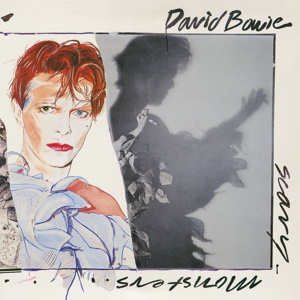
Scary Monsters (and Super Creeps), also known simply as Scary Monsters, is the fourteenth studio album by the English musician David Bowie, released on 12 September 1980 through RCA Records. His first album following the Berlin Trilogy (Low, "Heroes" and Lodger), Scary Monsters was Bowie's attempt at creating a more commercial record after the trilogy proved successful artistically but less so commercially.

Tonight is the sixteenth studio album by the English singer-songwriter David Bowie, released on 24 September 1984 through EMI America Records. The follow-up to his most commercially successful album Let's Dance, it was written and recorded in mid-1984 at Le Studio in Morin-Heights, Canada, following the conclusion of the Serious Moonlight Tour. Bowie, Derek Bramble and Hugh Padgham co-produced the album. Many of the same personnel from Let's Dance and the accompanying tour returned for Tonight, with a few additions. Much of Bowie's creative process was the same as he used on Let's Dance, similarly playing no instruments and offering little creative input to the musicians.
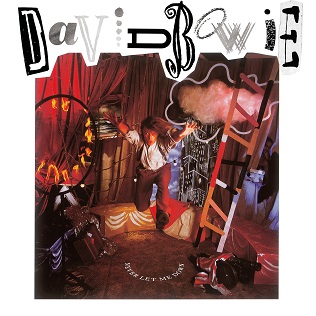
Never Let Me Down is the seventeenth studio album by the English musician David Bowie, released on 21 April 1987 through EMI America Records. Co-produced by Bowie and David Richards and featuring guitarist Peter Frampton, the album was recorded in Switzerland and New York City from September to November 1986. Bowie's goal for the project was to record it differently following his disappointment with 1984's Tonight. Musically, Never Let Me Down has been characterised as pop rock, art rock and hard rock; Bowie himself considered the record a return to rock and roll music. The cover artwork features Bowie surrounded by numerous elements from the songs.

"Rebel Rebel" is a song by the English singer-songwriter David Bowie. It was released in the UK on 15 February 1974 by RCA Records as the lead single from the album Diamond Dogs. Written and produced by Bowie, the song is based around a distinctive guitar riff reminiscent of the Rolling Stones. Cited as his most-covered track, "Rebel Rebel" has been described as Bowie's farewell to the glam rock movement that he had helped initiate, as well as being a proto-punk track. Two versions of the song were recorded: the well-known UK single release and the shorter US single release, which featured added background vocals, extra percussion and a new arrangement.

Black Tie White Noise is the eighteenth studio album by the English musician David Bowie, released on 5 April 1993 through Savage Records in the United States and Arista Records in the United Kingdom. Conceived following Bowie's marriage to the model Iman and the disbandment of his rock band Tin Machine, it was recorded throughout 1992 between studios in Montreux, Los Angeles and New York City. Bowie co-produced with his Let's Dance (1983) collaborator Nile Rodgers, who voiced dissatisfaction with the project in later decades. The album features several guest appearances, including previous collaborators Mike Garson and Mick Ronson, and new arrivals Lester Bowie and Chico O'Farrill.
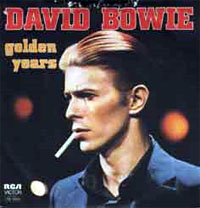
"Golden Years" is a song by the English musician David Bowie, released by RCA Records on 21 November 1975 as the lead single from his tenth studio album Station to Station (1976). Partially written before Bowie began shooting for the film The Man Who Fell to Earth (1976), the song was mostly compiled in the studio and was the first track completed for the album. Co-produced by Bowie and Harry Maslin, recording took place at Cherokee Studios in Los Angeles during September 1975. Due to Bowie's heavy cocaine use, he later recalled remembering almost nothing of Station to Station's production.

Tin Machine is the debut studio album by the Anglo-American hard rock band Tin Machine, released on 22 May 1989 through EMI America Records. The band consisted of the English singer-songwriter David Bowie, the American guitarist Reeves Gabrels and brothers Tony Fox and Hunt Sales on bass and drums, respectively, while Englishman Kevin Armstrong acted as an additional guitarist. The project was spearheaded by Bowie, who felt disconnected in his career by 1987 and looked to reinvent himself. After meeting Gabrels through his Glass Spider Tour, the two agreed to work together and would collaborate frequently for the next decade. Bowie hired the Sales brothers, neither of whom he had worked with since the 1970s, after a meeting in Los Angeles, while English producer Tim Palmer was hired to co-produce.

"Fame" is a song by the English singer-songwriter David Bowie. It was released on his 1975 album Young Americans and was later issued as the album's second single by RCA Records in June 1975. Written by Bowie, Carlos Alomar and John Lennon, it was recorded at Electric Lady Studios in New York City in January 1975. It is a funk rock song that represents Bowie's dissatisfaction with the troubles of fame and stardom.

"Cat People (Putting Out Fire)" is a song recorded by the English singer-songwriter David Bowie as the title track of the 1982 erotic horror film Cat People. Bowie became involved with the track after director Paul Schrader reached out to him about collaborating. The song was recorded at Mountain Studios in Montreux, Switzerland in July 1981. Bowie wrote the lyrics, which reflected the film, while the Italian producer Giorgio Moroder composed the music.

"Let's Dance" is a song by the English singer-songwriter David Bowie, originally included as the title track of his 1983 album of the same name. Co-produced by Nile Rodgers of Chic, it was recorded in late 1982 at the Power Station in New York City. With the assistance of engineer Bob Clearmountain, Rodgers transformed the song from its folk rock origins to a dance number through studio effects and new musicians Bowie had yet to work with. Bowie hired then-unknown Texas guitarist Stevie Ray Vaughan, who added a blues-edge.
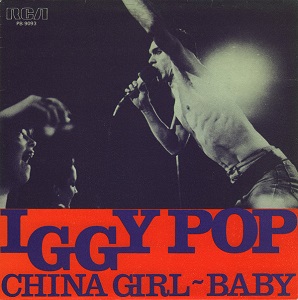
"China Girl" is a song written by Iggy Pop and David Bowie in 1976, and first released by Pop on his debut solo album, The Idiot (1977). Inspired by an affair Pop had with a Vietnamese woman, the lyrics tell a story of unrequited love for the protagonist's Asian girlfriend, realizing by the end that his Western influences are corrupting her. Like the rest of The Idiot, Bowie wrote the music and Pop improvised the lyrics while standing at the microphone. The song was released as a single in May 1977 and failed to chart.
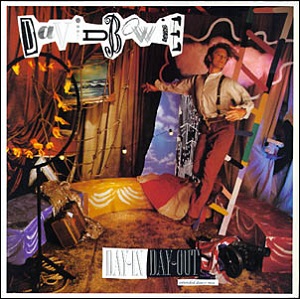
"Day-In Day-Out" is a song recorded by the English singer David Bowie, serving as the opening track for his seventeenth studio album, Never Let Me Down (1987). It was issued as a single on 23 March 1987 ahead of the record's release. The recording was solely written by Bowie, while production was handled by him along with David Richards. An R&B track, "Day-In Day-Out" criticizes the treatment of the homeless in the United States at that time, and deals with the depths to which a young mother sinks to feed her child.

"Never Let Me Down" is a song recorded by the English singer David Bowie, serving as the title track for his 1987 studio album Never Let Me Down. It was released as the third and final single from the record in 1987 and served as his last original solo single until 1992's "Real Cool World"; a remix of "Fame" was released in 1990. "Never Let Me Down" was a writing collaboration between the artist himself and Carlos Alomar, while production was handled by Bowie along with David Richards. The lyrics are about Bowie's relationship with his longtime personal assistant, Coco Schwab.

Toy is the twenty-seventh and final studio album by the English musician David Bowie, posthumously released in November 2021. It was recorded from July to October 2000 in New York City and featured re-recordings of songs Bowie recorded between 1964 and 1971, along with a couple of new tracks. The project was co-produced by Bowie and Mark Plati and featured musicians from Bowie's then-touring band—Plati, Earl Slick, Gail Ann Dorsey, Mike Garson and Sterling Campbell—with overdubs from Lisa Germano, Gerry Leonard and Cuong Vu.




















